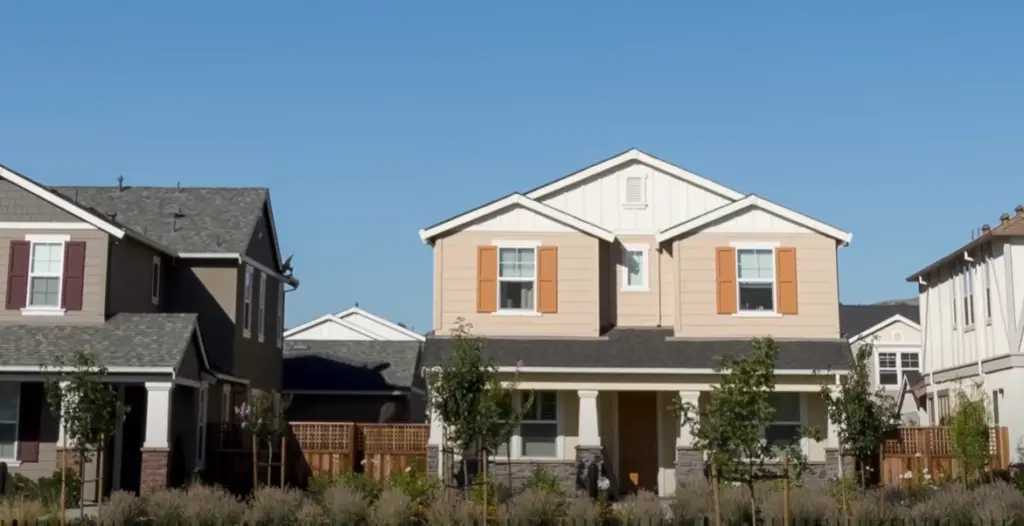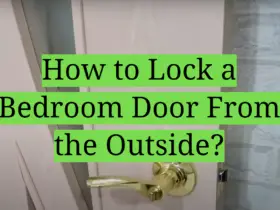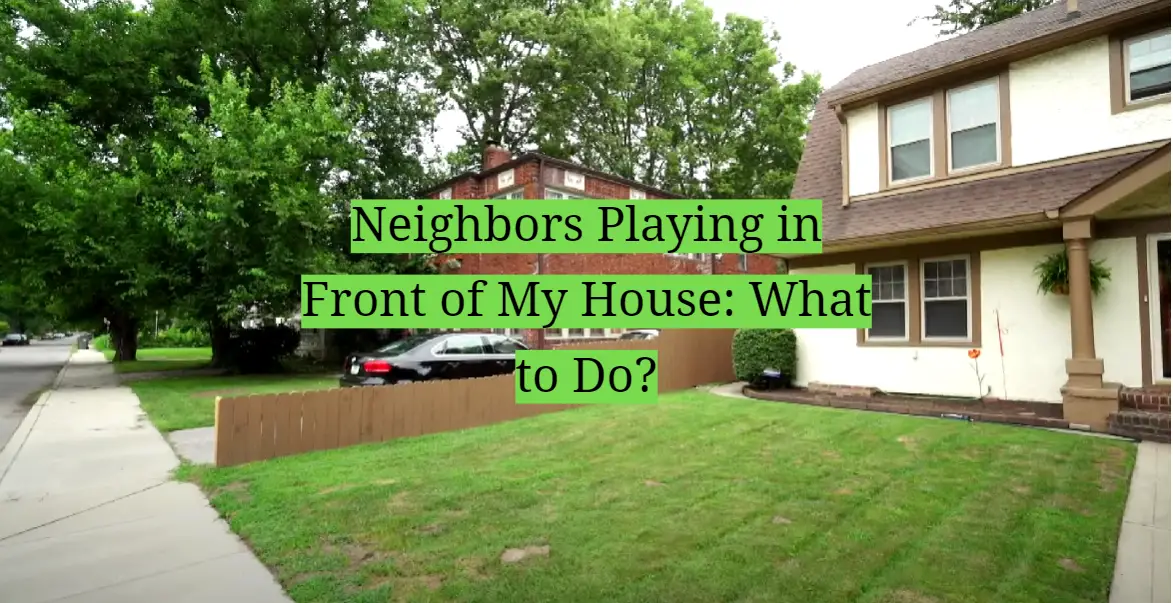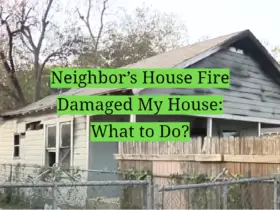It’s not uncommon to look out your window and find your front yard a hive of activity, especially if you live in a neighborhood with many children. While this can sometimes be a source of joy and community spirit, there could also be times when it becomes a nuisance – whether it’s the noise, the mess, or concerns about damage to your property. In this guide, we’ll explore some practical, respectful approaches to managing such situations, ensuring a harmonious coexistence with your neighbors.
Signs of disrespectful neighbors
Recognizing signs of disrespectful neighbors can help you address issues early and maintain a peaceful living environment. Here are some common signs that your neighbors might be lacking in respect:
Noise Disturbances: Constant loud music, parties, or disruptive noise during quiet hours could be signs of disrespectful neighbors. Disregarding for noise levels shows a lack of consideration for others’ peace and tranquility.

Trespassing: If your neighbors regularly cross onto your property without permission, this is an overt sign of disrespect for your property boundaries.
Littering: If your neighbors leave trash or debris in shared spaces or on your property, this shows a disregard for cleanliness and respect for others’ spaces.
Invasion of Privacy: Neighbors who peer into your home or garden, or who seem overly interested in your personal life, are not showing appropriate respect for your privacy.
Pet Problems: If your neighbors’ pets are causing problems, such as barking excessively, being aggressive, or using your yard as a bathroom, and your neighbors take no action to correct this, it shows a lack of respect for you and your property.
Poor Communication: If your neighbors are unresponsive to your concerns or react hostilely when you try to address issues, this can be a sign of disrespect.[1]
How can I address the issue of neighbors consistently playing in front of my house?
Open Communication
First and foremost, consider having an open and friendly conversation with your neighbors. It’s possible that they aren’t aware of the inconvenience they are causing. When addressing the issue, maintain a calm and respectful demeanor. Discuss your concerns about the noise, the mess, or potential property damage and request that they redirect their activities elsewhere. If the neighbors involved are children, talk to their parents. Remember, the aim is not to accuse, but to reach a solution that suits both parties.

Set Boundaries
If the issue persists, consider setting boundaries around your property. You might want to install a fence or hedges as a physical deterrent. Placing ‘Private Property’ or ‘No Trespassing’ signs can also help clarify property lines and limit intrusion. Just ensure any measures you take are in accordance with local zoning laws and homeowners’ association rules.
Engage Authorities
As a last resort, if your concerns continue to be overlooked, you may need to involve local authorities. Check with your local city or county codes to understand your rights and responsibilities as a homeowner. Depending on the nature of the issue, law enforcement or a mediation service might be able to assist. Always keep the aim of maintaining a positive neighborhood relationship in mind even when taking this step.
Living in a residential community can be very enjoyable, provided everyone respects each other’s boundaries. When faced with neighbors consistently playing in front of your house, try having open and friendly conversations to reach a mutually beneficial solution. If that fails, then physical or legal measures may need to be enforced. Above all else, keep the intention of maintaining good relationships and promoting harmony in the neighborhood. Doing so will ensure that your street remains an enjoyable place to live for everyone.
The key is to remain respectful, understanding, and proactive when addressing these issues. With tactful communication, you should be able to resolve matters without any lingering animosity – ensuring a harmonious living environment for all.
How do I set boundaries with my neighbors’ children?
Setting boundaries with your neighbors’ children requires a balancing act of tact and firmness. The approach should be respectful and considerate of the child’s feelings and age.

Communicate with the Parents: The first step should be to discuss the issue with the child’s parents. Let them know about your concerns and the need for setting boundaries for their child around your property. Make sure to approach the topic politely and express your need for peace, safety, or whatever your concern may be.
Explain the Boundaries to the Children: Once the parents are onboard, explain the boundaries to the children in a simple, clear, and friendly manner. Children are more likely to respect your boundaries if they understand what they are and why they are important.
Use Visual Signs: If verbal communication isn’t sufficient, consider using visual signs to demonstrate where the limits of your property are. This can be done by installing a fence or even simple decorative items that subtly mark the boundary.
Reinforce the Boundaries: If the children accidentally forget and cross the boundaries, gently remind them of the limits. Repetition and reinforcement can help them internalize the boundaries over time.
Remember, it’s important to maintain a friendly relationship with both the parents and the children. Patience, understanding, and consistency are key when setting and maintaining boundaries.[3]
Can I Legally Play in Front of My Neighbor’s House?
The answer to whether you can legally play in front of your neighbor’s house varies depending on local laws and regulations. In many cases, if the area you’re playing in is a public space like a sidewalk or street, it’s generally legal. However, if you’re trespassing onto private property such as a lawn or driveway, it could potentially violate local ordinances or trespassing laws.
Being aware and respectful of the boundaries and comfort of those living around you is key to maintaining a harmonious neighborhood environment.
Remember, when in doubt, the best course of action is to ask permission or find another area to play that doesn’t invade someone else’s space.
Is it impolite to play in front of a neighbor’s house?
The perception of politeness or impoliteness is often subjective and can vary widely depending on specific circumstances and cultural norms. Generally, playing in front of a neighbor’s house is not considered impolite if the area is public property, the activity is not disruptive, and it doesn’t infringe upon your neighbor’s privacy or damage their property.

However, if the activity is noisy, messy, or causes damage, it could certainly be seen as inconsiderate or impolite. Similarly, if the area being used is actually part of your neighbor’s private property, then it is inappropriate to use it without their consent.
It’s important to consider the impact of your actions on those around you.
How can I keep Neighbors away?
Keeping neighbors at a distance while maintaining a congenial neighborhood environment requires a blend of assertiveness and diplomacy. Here are a few strategies that could help:
Privacy Landscaping: Consider using plants, trees, or hedges to form a natural barrier that increases privacy and subtly discourages neighbors from wandering onto your property.

Install a Fence: A fence not only demarcates your property line clearly, but it also serves as a physical barrier preventing neighbors from crossing onto your property without permission.
Avoid Over-Familiarity: While it’s important to be friendly with your neighbors, try to avoid becoming overly familiar. Keep casual conversations brief and don’t share too much personal information.
Use ‘No Trespassing’ Signs: If your local regulations allow it, consider putting up a ‘No Trespassing’ sign. This can be an effective deterrent, especially if neighbors are not respecting your property boundaries.
Consult Local Authorities: If you have tried the above steps and your neighbors still repeatedly infringe on your privacy or trespass on your property, you may need to involve local authorities or a homeowners’ association, if applicable.
Remember, the aim is to live in harmony with your neighbors. It’s always best to address any issues directly and respectfully, keeping open lines of communication whenever possible.[4]
FAQ
How to handle nosy neighbors?
Handling nosy neighbors requires tact and assertiveness. Here are some strategies that could help:
Polite Conversation: Start by having a polite conversation with your neighbor. It’s possible they’re unaware that their behavior is intrusive or bothersome. Express your feelings and set clear boundaries about what you consider private.
Avoid Oversharing: Providing too much information could encourage nosiness. Be cordial but try to keep conversations general and limited to safe topics.
Use Privacy Measures: If your home is visible from your neighbor’s property, consider utilizing blinds, curtains, or fences to enhance privacy.
Involve Property Management: If you live in a housing community with a homeowners’ association or property management, consider bringing the issue to their attention. They may be able to address the issue directly or lay down community guidelines to protect residents’ privacy.
Seek Legal Advice: If your neighbor’s behavior becomes overly intrusive or breaches the law, consult with a lawyer or law enforcement to explore your options.
Remember, it’s essential to maintain a peaceful and respectful neighborhood environment. It’s always best to address any issues openly and respectfully.
Can my neighbor enter my garden without permission?
Your neighbor is not allowed to enter your garden without your permission. In most jurisdictions, this is considered trespassing, even if there isn’t any malicious intent involved. It’s always crucial to respect property boundaries, whether it’s a garden, backyard, or even a shared driveway. If a neighbor continually enters your garden without permission, you have the right to politely ask them to stop. If the issue persists, you may need to involve local law enforcement or take legal action. However, it’s generally best to try resolving the issue amicably through clear communication first. Keep in mind that laws can vary based on location, so it’s always a good idea to consult a local legal expert if you’re unsure about your rights and responsibilities.
In addition, if you live in a housing community with a homeowners’ association or property management, consider bringing the issue to their attention. They may be able to address the issue directly or lay down community guidelines to protect residents’ privacy. If your home is visible from your neighbor’s property, consider utilizing blinds, curtains, or fences to enhance privacy.[2]
Strategies for Handling Intrusive Neighbors
Dealing with this type of neighbor can be a delicate task, requiring a balance between asserting your rights and maintaining cordial community relations. Here are some strategies that could be effective in handling intrusive neighbors:
Direct Conversation: The first step in resolving any issue is open and honest communication. Politely informing your neighbors of your concerns can often be the most effective way to address the problem. It’s possible they might not realize their actions are causing discomfort.
Use Curtains or Blinds: If your neighbor’s intrusive behavior involves peering into your home, using curtains or blinds can provide an effective and non-confrontational solution, preserving your privacy and sending a clear message about your comfort levels.
Write a Letter: If the face-to-face conversation feels too confrontational, consider writing a letter to your neighbors, expressing your concerns diplomatically and requesting a change in behavior.
Involve a Mediator: If your attempts to resolve the issue do not succeed, consider involving a neutral third party, like a community mediator, to facilitate a conversation and help find a compromise.
Seek Legal Advice: If the intrusive behavior persists, it might be necessary to seek legal advice. It’s important to know your rights when dealing with issues like trespassing or invasion of privacy.
Remember, it’s crucial to approach these situations with patience and understanding. A peaceful neighborhood relies on mutual respect and consideration among all residents.[5]
How to Ignore Bad Neighbors
Ignoring bad neighbors can be a challenge, but certain strategies can help you maintain your peace of mind:
Develop a Thick Skin: While it might not be easy, try not to let your neighbor’s actions get under your skin. Remember, their behavior is a reflection of them, not you.
Distractions: Engage in activities that you enjoy and that help you relax, such as reading, gardening, or listening to music. These can help distract you from any negative behavior.
Noise-Canceling Headphones: If noise is an issue, consider investing in a pair of headphones. They can help you ignore any loud music, arguing, or other disruptive sounds.
Avoid Contact: If possible, avoid unnecessary contact with your bad neighbors. If you don’t give them an opportunity to engage with you, there will be less chance for conflict.
Focus on the Positive: Try to focus on the positive aspects of your neighborhood. Perhaps you have other great neighbors, or you love the location. Concentrating on the good can help counterbalance the negative.
Remember, it’s important to live in a peaceful neighborhood. If your neighbor’s behavior becomes unbearable, don’t hesitate to seek advice from local authorities or legal professionals.
How do you talk to bad neighbors?
Initiating a conversation with bad neighbors can be a daunting task, but it’s often the first step toward resolution. Here’s how you can approach it:
Choose the Right Time: Find a suitable time to have a conversation where you both can discuss the issue without being rushed. Avoid times when they may be stressed or preoccupied, such as early mornings before work or late evenings.
Be Polite and Calm: Approach them with a calm demeanor, even if the issue at hand is frustrating. Stay respectful and composed throughout the conversation.
Explain Your Concerns: Clearly communicate your concerns. Be specific about the issues you’re facing due to their behavior. It’s possible they may not realize their actions are causing a problem.
Seek a Resolution: After explaining your concerns, propose a possible resolution that would work for both parties. Be open to their suggestions as well.
Maintain Body Language: Your body language should be non-threatening and open. Avoid crossing your arms or appearing defensive.
Follow Up: If the issue continues, consider following up with them. If the behavior still doesn’t change, you may want to explore other strategies mentioned in the previous sections.
Remember, the goal is to maintain a peaceful living environment. Your approach should aim for resolution, not confrontation.
Remember, everyone has a right to a peaceful living environment. If you notice these signs, consider addressing the issue directly with your neighbor, or seek advice from a mediator, homeowners’ association, or legal professional.[6]
Which neighbor behaviors are the most bothersome?
Loud Noises: Whether it’s booming music, roaring engines, or the constant cacophony of construction, loud noises particularly during quiet hours, top the list of the most bothersome neighbor behaviors.
Pets Issues: Problems related to pets, such as dogs barking at all hours, pets roaming freely, and not cleaning up after them, can cause serious friction between neighbors.
Invasion of Privacy: This can include neighbors who are constantly peering into your home, asking too many personal questions, or otherwise intruding upon your personal space.
Disregard for Property: This behavior includes instances where neighbors discard their trash on your property, damage your belongings, or trespass on your land.
Bad Parking: Neighbors who block your driveway, park their vehicle on your property, or take up multiple spots on the street can be a continuous source of annoyance.
Unattended Children: Neighbors who allow their children to run rampant, making noise and causing disturbances, can also be quite bothersome.
By identifying the types of behavior that are the most bothersome, you can take appropriate actions to resolve the issues and maintain a peaceful neighborhood.
How do you deal with gossipy neighbors?
It can be challenging, but it is feasible with the right approach:
Maintain Privacy: Be mindful of what you share with your neighbors. The less personal information they have about you, the less they can gossip about.
Politely Excuse Yourself: If a neighbor starts to gossip, it’s perfectly acceptable to politely excuse yourself from the conversation. You might say, “I’m sorry, but I don’t feel comfortable discussing this.”
Set Boundaries: If the gossip continues, you may need to set clear boundaries. Politely but firmly let them know that you’re not interested in participating in gossip.
Change the Conversation: Try to steer conversations with your neighbor towards neutral topics like the weather, gardening, or local events.
Avoid Confrontation: It’s not necessary to confront a gossipy neighbor directly about their behavior, which could lead to more tension. Instead, focus on managing your reactions and interactions with them.
Remember, dealing with gossipy neighbors is all about setting and maintaining boundaries while avoiding exacerbating the situation.[3]
Useful Video: ANNOYING NEIGHBORS – THIS IS FRUSTRATING
Conclusion
Living in a neighborhood requires mutual respect and understanding among residents. Dealing with inconsiderate neighbors can be challenging, but there are proactive steps you can take to address concerns and restore peace. Remember, it’s crucial to communicate effectively, remain patient, and focus on resolution rather than confrontation. If all else fails, never hesitate to seek assistance from local authorities or legal professionals. Keep in mind, everyone has a right to a peaceful living environment.
References:
- https://homeardent.com/neighbors-playing-in-front-of-my-house/
- http://www.simplysweethome.com/2020/03/7-signs-neighbor-watching-you-what-to-do/
- https://www.wikihow.com/Ignore-Bad-Neighbors
- https://www.today.com/home/9-smart-tips-how-handle-nasty-neighbors-t75371
- https://www.safewise.com/blog/protect-nosey-neighbors/
- https://reolink.com/blog/how-to-keep-annoying-kids-off-your-property-while-you-are-away/










Leave a Reply